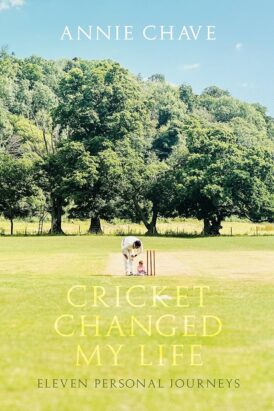Cricket Changed My Life
Martin Chandler |Published: 2025
Pages: 172
Author: Chave, Annie
Publisher: Fairfield Books
Rating: 4.5 stars

It isn’t all that long ago that I could put my hand on my heart and say that I had never heard of Annie Chave. And then, back in the dark days of the winter of 2019, she brought us the first issue of County Cricket Matters, and since then I have been reminded on a quarterly basis of just how remarkable a person she is. Tenacious, insightful and knowledgeable are just three of the adjectives that immediately spring to mind.
So I did think, when I heard a few months ago that Annie had turned her mind to long form cricket writing and was working on her first book, that she might be taking a bit of risk. Could she really maintain the standards she had set herself? It is a question that I have been pondering for some time, and one to which I now know the answer.
At its most basic Cricket Changed My Life is a collection of biographical essays and, for once unimaginatively, there are a team of them, so eleven chapters (including one double one) in all. Five of the subjects are England Test cricketers, although none have more than Enid Bakewell’s dozen caps. The other four are David ‘Bumble’ Lloyd (9 Tests), Sue Redfern (6), Fred Rumsey (5) and Roland Butcher (3). Also featured is Callum Flynn, skipper of the England Men’s Physical Disability team.
There are three broadcasters in Georgie Heath, Daniel Norcross and Aussie Bharat Sundaresan, and the numbers are made up by Waleed Khan, a remarkable man who overcame the effects of horrendous injuries sustained in a terrorist attack and two Syrian refugees, Missal Al-Jaber and Maram Al-Khodir.
The stories of each of the subjects are, in different ways, inspirational. The story of Khan is the most remarkable. Shot six times in the head as a twelve year old in a terrorist attack on his school in Pakistan that left all of his classmates dead he was at one point given a 0.5% chance of survival. Not only did he do so but, after arriving in the UK for successful reconstructive surgery, the now 23 year old has, with much assistance from his passion for cricket, rebuilt his life.
Not too far behind is Flynn, another who faced the prospect of death albeit in a rather different way. He plays the game with, thanks to bone cancer dictating that he should have a titanium knee, a significant disability. He also has the memory of that surgery and had the affect of chemotherapy to contend with. Another variation on that theme is Georgie Heath, who has overcome serious mental health issues and an eating disorder to achieve the far from easily attainable goals of writing and broadcasting on cricket.
The two young female Syrian refugees live in cramped and overcrowded conditions in Lebanon. The way in which cricket has enriched their lives is not entirely dissimilar to the way in which the game began in Afghanistan back in the 1990s and reading their chapter left me wondering whether history might repeat itself there?
The players’ stories are of course very different, but struggles were involved in their lives too. Butcher was the first man of Afro-Caribbean descent to play for England with the attendant issues that created. Rumsey was the man who was the driving force behind the creation of the players union, the Professional Cricketers’ Association, and Lloyd of course is a man who has played many cricketing roles, and emerged from an interesting background in, as everyone knows, Accrington in East Lancashire.
As for Bakewell and Redfern, both from Nottinghamshire, the former was an all-rounder of such quality that in her twelve Tests she averaged 59.88 with the bat and 16.62 with the ball, figures which would justify legendary status if repeated in the men’s game. Redfern’s Test figures are not so impressive, but she did become a Test cricketer and is now an umpire of such standing that, in 2023, she became the first woman to officiate in a men’s First Class match.
Sundaresan’s story is of how, after a difficult childhood in India he overcame drug issues to become a noted writer and broadcaster. That of Norcross is not quite so dramatic, but the fascinating story of how he went from being an enthusiastic and unconventional amateur commentator on Test Match Sofa to being a member of the very traditional Test Match Special team is one that had completely passed me by.
The centrepiece of most issues of County Cricket Matters is an interview by Annie, so it is no surprise that her book is based on conversations with her subjects. The stories that are told are by their nature gripping ones so it is the way that they are related that is the key issue for review and it was no surprise to me that Annie’s style is much the same as it is in County Cricket Matters. She asks all the right questions, clearlyt has the priceless ability to put her interviewees at their ease, and then lets the stories tell themselves. The longer form writing does afford her the chance to be more discursive, an opportunity that she fully embraces.
I sincerely hope that Cricket Changed My Life is not a one off and that in the future we get more books from Annie, assuming her ever expanding list of engagements affords her the time to write them. Ideally she will find another selection of people as interesting and varied as the selection she has found here, although I concede that might be expecting too much. But if so there are other genres she could turn her undoubted talents to.






Leave a comment